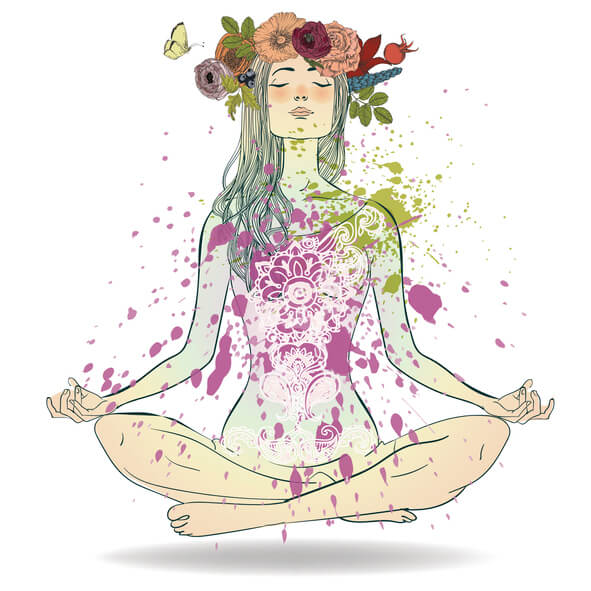It’s easy to be overwhelmed by conflicting messages when contemplating pleasure, spirituality and sex – especially solo sex, which has been condemned by many spiritual authorities throughout history, while being promoted by others as an essential practice for self-care and honoring the divine design.
This is an ancient conflict — one that continues to the present day.
Some teachers hold that life-force energy is drained or compromised by sex (whether partnered or solo), and various disciplines have arisen — from total celibacy to practices of non-ejaculatory or non-orgasmic sex.
Other, more permissive traditions advocate for full sexual expression as an aspect of divine incarnation.
This message has been simplified into the westernized, pop-Tantra approach, which can provide empowering messages for those fleeing the shame often imposed by Judeo-Christian narratives – but this can also become a subtle trap, portraying sexual pleasure as yet another “aspirational” target to hit or a yardstick to measure up to.
What’s a yogi to do with all these contradictions?
The Nature of Desire
In Buddhism, of course, desire – the craving for pleasure and material things – lies at the root of all suffering. (Learn more in The Wisdom of Non-Attachment and 3 Ways to Practice This Freeing Yogic Principle.)
And it’s true that desire, as an end in itself, can be unending, and unfulfillable.
However, if we’re not living in a monastery or otherwise pledged to the rigor of a formal spiritual order, is it realistic for us to eschew all pleasure?
Especially since asceticism itself, when pursued for its own sake, can become an endless quest for attainment – only another unfulfillable urge.
Outside the monastery, many teachers talk about desire not as something to extinguish, but as something to bring awareness to, helping us to become more conscious of our impulses and unconscious motives. (Learn more in Renunciation: An Invitation to Fulfillment.)
A dedicated meditation practice tends to shift those impulses naturally, without requiring external interventions such as removing all temptation, subsisting exclusively on bland food, or eschewing a weekly (or daily!) orgasm.
Consider that this beautiful world, and our beautiful bodies (as ephemeral as they are) are still divine creations, meant to be used, enjoyed, and celebrated.
Our daily human activities (breathing, eating, walking, and engaging in sexual activity) may be viewed as an opportunity for meditation in action, for slowing down to observe the origins of our desires, while still being in service of loving kindness.
Just as eating more slowly/consciously can lead to greater enjoyment and healthier choices, the mindful pursuit of sexual pleasure – alone or with a partner – can lead to a more authentic expression of that pleasure, as well as more deeply-felt satisfaction.

The Sacred “O”
Orgasm is an energetic crisis, in the best possible way – it’s sometimes called “the little death” for good reason.
When we’re overwhelmed by our own sexual power, in that moment, the ego dissipates. (Learn more in How to See the Ego for What it Is.)
It’s just us, our partner (if we have one – a partner certainly isn’t mandatory!) and our divinely-created body/mind.
Orgasm can be a momentary pleasure to be pursued in unending cycles – or it can be a profound catharsis, cleansing tension and feeding a new sense of joy, love, and equanimity.
Or sometimes it’s just a prelude to a great nap.
It’s important to consider that chasing orgasms can lead us dangerously close to the desire-suffering trap – especially if we have trouble reaching orgasm, or don’t have orgasms at all.
For people of all genders, the inability to “perform” can lead to great shame and anxiety.
This is often aggravated by negative messaging from the culture we’re all steeped in – perhaps the belief that our genitals are “dirty” and our sexual urges sinful or unseemly.
A mindful self-pleasure practice, conducted in the spirit of joyful exploration, even without a particular goal in mind – just consciously experiencing our bodies and the sensations our touch creates – can go a long way towards alleviating that shame and embracing our selves as we are. (Learn more in Self-Love Practices to Teach Yourself How to Love You.)

Towards Orgasmic Practice
If you usually treat self-pleasure as a reflexive habit, undertaken without much thought – or if you’re not used to exploring yourself this way at all – there are a few tools and practices that can be useful for getting into a more mindful space.
Poses like single-leg balances and hip openers can activate fine muscles in the area of your root chakra, relax your perineal muscles, and improve circulation.
Kegel exercises — discussed in Tantric texts as a partner-sex technique, but also as a valuable solo practice — are said to unlock Kundalini energy while physiologically expanding your capacity for pleasure.
And, of course, breath work is always an essential component of any mind-body practice, including sex.
You can also look to the natural world for a botanical assist. (Learn more in CBD: The Ayurvedic Connection.)
Foria’s Awaken Arousal Oil was formulated for everyone who has a vulva, and was designed to help ease tension, elevate sensation and enhance natural wetness.
This fragrant, all-natural “pre-lube” is infused with Kava Kava and CBD from sun-grown hemp, plus synergistic organic plant essences for a deliciously immersive experience – solo or with a partner.
And now, Yogapedia readers can enjoy 20% off Awaken – just use code YOGA20 at checkout.
During These Times of Stress and Uncertainty Your Doshas May Be Unbalanced.
To help you bring attention to your doshas and to identify what your predominant dosha is, we created the following quiz.
Try not to stress over every question, but simply answer based off your intuition. After all, you know yourself better than anyone else.